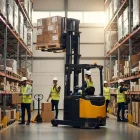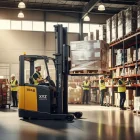Purchasing a forklift is a significant investment for any business, whether you’re expanding your current operations or just starting out. With a variety of options available, choosing the right forklift can be a daunting task. From electric forklifts to diesel-powered machines, understanding the various types of forklifts for sale can help you make an informed decision that aligns with your business needs.
Understanding Different Types of Forklifts
When you’re in the market for forklifts, it’s essential to understand the different types available. Each type of forklift is designed for specific tasks and environments. Here’s a breakdown of the most common types:
Electric Forklifts
Electric forklifts are powered by batteries and are an excellent choice for indoor use. They are quieter than their fuel-powered counterparts and produce no emissions, making them environmentally friendly. Electric forklifts are ideal for businesses that prioritise sustainability and operate in noise-sensitive environments.
Diesel Forklifts
Diesel forklifts are known for their power and durability. They are best suited for outdoor use, particularly in rough terrain or construction sites. These forklifts have a longer lifespan and are capable of handling heavier loads compared to electric forklifts. However, they do produce emissions and are typically noisier.
Gasoline and LPG Forklifts
Gasoline and Liquid Propane Gas (LPG) forklifts offer a balance between electric and diesel types. They are versatile and can be used both indoors and outdoors, though proper ventilation is necessary when operating indoors due to emissions. LPG forklifts are known for their quick refueling time, which can be a significant advantage in a fast-paced environment.
Key Factors to Consider When Buying a Forklift
Selecting the right forklift requires careful consideration of several factors. Here are some crucial aspects to keep in mind:
Load Capacity
Consider the maximum weight your forklift needs to lift. Each forklift has a specific load capacity, and choosing one that matches your needs is critical to ensuring safety and efficiency in your operations.
Lift Height
Determine how high you need to lift materials. Forklifts come with varying lift heights, and selecting the right one depends on your storage requirements and warehouse setup.
Environment
Think about where the forklift will primarily be used. For instance, electric forklifts are better suited for indoor environments, while diesel forklifts are more appropriate for outdoor use.
Fuel Type and Efficiency
Evaluate the cost of fuel and overall efficiency. Electric forklifts might have a higher upfront cost but can save money over time with lower fuel and maintenance costs. Conversely, diesel and LPG forklifts may have lower initial costs but could incur higher fuel expenses.
Finding a Reliable Forklift Dealer
When looking for forklifts, partnering with a reputable forklift dealer is crucial. A reliable dealer will offer quality equipment, provide maintenance services, and support you throughout the purchasing process. Here’s how to find the right dealer:
Research and Reviews
Start by researching local dealers and reading customer reviews. Look for dealers with a good reputation and positive feedback regarding their products and services.
Dealer Experience
Consider the dealer’s experience in the industry. Dealers with years of experience are more likely to offer expert advice and a wide range of products.
After-Sales Support
Ensure the dealer provides comprehensive after-sales support, including maintenance services and parts availability. This support is essential to keep your forklift in optimal working condition.
The Importance of Regular Maintenance
Regular maintenance is vital to extend the lifespan of your forklift and ensure safety. Here are a few maintenance tips:
Daily Inspections
Conduct daily inspections before operating the forklift. Check for any visible damages, tire pressure, and fluid levels.
Scheduled Servicing
Follow the manufacturer’s recommended service schedule. Regular servicing by a professional can prevent minor issues from becoming major repairs.
Operator Training
Ensure that all forklift operators are adequately trained. Proper training not only enhances safety but also promotes efficient use of the equipment.
Conclusion: Making the Right Choice
Choosing the right forklift for your business involves understanding your specific needs and carefully evaluating available options. Whether you opt for an electric forklift for its environmental benefits or a diesel forklift for its power and durability, the key is to make a decision that aligns with your operational requirements.
By considering factors such as load capacity, lift height, and the operating environment, and by partnering with a reliable forklift dealer, you can ensure that your investment in a forklift will serve your business well for years to come.
In conclusion, when searching for forklifts, take your time to research and compare different models and dealers. With the right information and support, you can confidently choose the equipment that will enhance your business operations.




